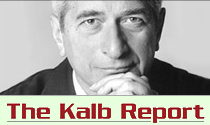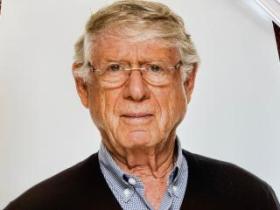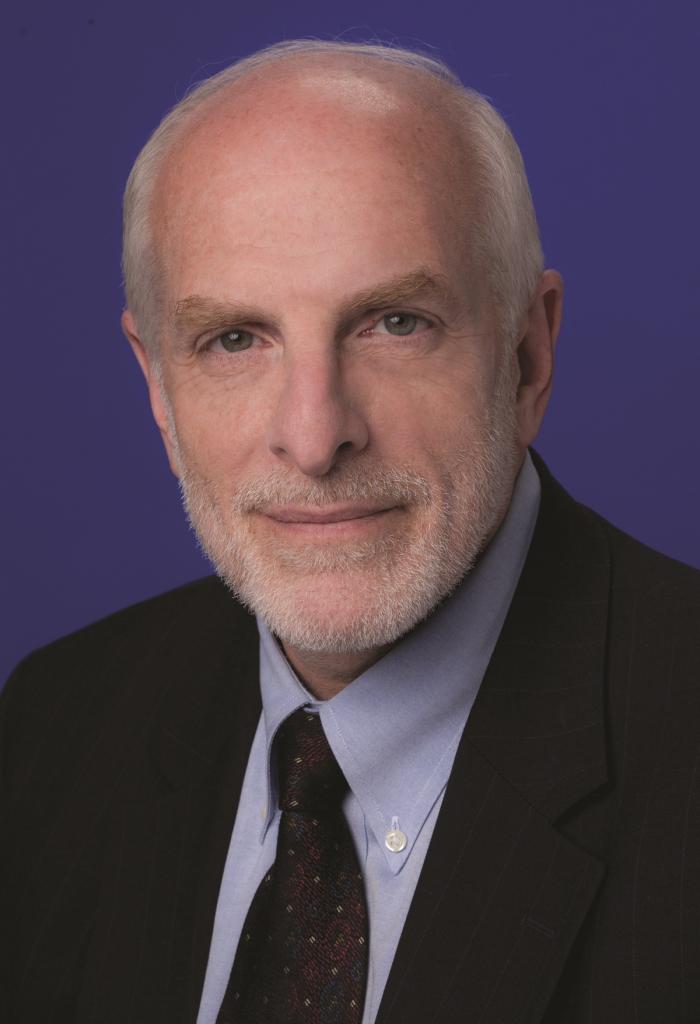'Kalb Report' signs off for last time with segment to air Feb. 18

“The Kalb Report: Goodnight and Good Luck” with Marvin Kalb and Ted Koppel concludes Club’s historic broadcast series after nearly three decades
After 28 years and 103 programs, the longest-running and most successful long-term project in National Press Club history, The Kalb Report public broadcasting series, comes to a close this spring as moderator Marvin Kalb and his long-time friend and fellow network news correspondent Ted Koppel look back, around and ahead at the challenges for both journalism and our democracy.
The program, recorded in November, will premiere on Maryland Public Television on Saturday, Feb. 18, at 7 p.m., with an encore presentation Sunday, April 23, at 4 p.m. It also will be available online via MPT and the Club, and a spring reception is planned at the Club to conclude the series.
 In the series finale, the 92-year-old Kalb reflects on his broadcast news career that stretches back to 1957 as Koppel turns the tables on him and becomes the interviewer. They explore the symbiotic state of American democracy and the press from the Cold War to the War on Truth. Interwoven into the program are video excerpts and photographs from past Kalb Reports, as well as of Kalb as he reported for CBS News in the eras of Edward R. Murrow and Walter Cronkite.
In the series finale, the 92-year-old Kalb reflects on his broadcast news career that stretches back to 1957 as Koppel turns the tables on him and becomes the interviewer. They explore the symbiotic state of American democracy and the press from the Cold War to the War on Truth. Interwoven into the program are video excerpts and photographs from past Kalb Reports, as well as of Kalb as he reported for CBS News in the eras of Edward R. Murrow and Walter Cronkite.
“This is a concluding opportunity for me to express my own views about the current state of journalism, about its continuing central importance to maintaining American democracy, which I describe as ‘fragile,’ constantly in need of fresh reinforcements of truth, honesty and honor to survive,” Kalb said.
American democracy, he said, “has never been a sure thing. It now desperately needs a vibrant, unafraid corps of get-up-and-go journalists.”
Perhaps the program that Kalb most enjoyed was the 2014 joint appearance of Supreme Court justices Antonin Scalia and Ruth Bader Ginsburg, who despite disagreeing on many court decisions, were close personal friends.
Kalb asked them to select one freedom that is most essential to the functioning of a democracy. Scalia said freedom of speech, because democracy depends on open discussion, while Ginsburg said freedom of the press. A free press is a watchdog of government and keeps government “from getting too far out of line,” she said.
When Kalb interviewed Walter Cronkite, the legendary CBS News anchor once known as “the most trusted man in America,” in 1998 he said something prescient that has become a central issue today. Kalb asked if he were concerned that politicians who don’t like the press would push for legislation to contain it, opening the way to a totalitarian state.
The response, Kalb said, was that Cronkite believed democracy was not in danger – unless the Supreme Court loses its objectivity and becomes too closely connected with a political party or a political movement.

“It sounds almost as if Walter was taking a peek into the future and seeing us today,” Koppel said.
Also highlighted throughout the 28-year run was the expanding role of women in the upper levels of journalism. Diane Sawyer, the first female correspondent on “60 Minutes,” remembered her early days:
“I knew I was in trouble when the entire group of the '60 Minutes' correspondents walked down the hall on something really important and said, ‘Here's what we're going to do,’ and ended it in the men's room.”
The Kalb Report was created in 1994 when Kalb was on a one-year sabbatical from Harvard University to return to Washington to teach at George Washington University. Kalb was the last correspondent personally hired by Edward R. Murrow, and his career had taken him around the world as the CBS News chief diplomatic correspondent. He was later moderator of NBC’s Meet the Press before leaving the networks after more than 30 years to become the founding director of Harvard’s Shorenstein Center on Media, Politics and Public Policy.

At GW, Kalb found a partner in former CBS Radio Network General Manager Michael Freedman, who went on to become Club president in 2020. Freedman brought Kalb to the Club to present the idea for the series to then-President Gil Klein, who quickly embraced it. The first of nine programs for the first season was produced on Sept. 29, 1994, and Freedman remained executive producer for the entire 28-year run.
Freedman arranged grants to produce the series, with Oklahoma-based Ethics and Excellence in Journalism Foundation, a division of Inasmuch Foundation, underwriting the project for the past two decades, and he successfully worked to get programs aired on public television stations across the country as well as on National Public Radio, Sirius XM Satellite Radio and Federal News Radio in Washington. Maryland Public Television has served as “presenting station” for the series for the past several years.
Purpose was to discuss state of journalism and politics
From the beginning, Kalb said the purpose was to bring top journalists and newsmakers to the Club for an hour-long discussion of the state of journalism and politics that would attract students as well as Club members. By the end of the first program, Kalb said he could see that the defining theme for the series was the news media’s impact on American democracy.
“Over nearly three decades, The Kalb Report has followed the sometimes-tortuous course of American journalism as it has endured one of the most radical changes in history,” Freedman said in summing up the show’s impact. “Time and again, Marvin and his guests have highlighted the essential work of a free and non-partial news media to democracy, and by working with students during the entire run, we hope we have passed that legacy on to the next generation.”
In addition to Justices Scalia and Ginsburg, Walter Cronkite and Diane Sawyer, guests have included Bob Woodward and Carl Bernstein (together); Ken Burns; Katie Couric; Christiane Amanpour; civil rights icons John Lewis, Julian Bond and Andrew Young (together); Apollo 11 astronaut Michael Collins; Hillary Clinton; David McCullough; Cokie Roberts; Dan Rather; Rupert Murdoch; Roger Ailes; Bill O’Reilly; Bob Costas; Dean Baquet and Marty Baron (together); Major League Baseball Commissioner Rob Manfred; Jake Tapper; Judy Woodruff; Eugene Robinson; Lesley Stahl; Sam Donaldson; Nina Totenberg; Susan Stamberg; Jim Lehrer; Bob Schieffer; Richard C. Hottelet; Don Hewitt; Casey Murrow; Daniel Schorr; Gwen Ifill; Chris Wallace; Helen Thomas; Charles Gibson; Brit Hume; and Nobel Prize recipient Elie Wiesel.
The Kalb Report series was most recently honored with a 2018 Gold World Medal in the New York Festivals International Radio Awards competition. The series also received Gold World Medals in 2015 and 2012, when it was presented the organization’s overall Grand Award.
In addition to moderator Marvin Kalb and Executive Producer Michael Freedman, The Kalb Report team has included Senior Producer Heather Date, announcer Dick Golden, and producers Tiina Kreek, D. Scott Graham, Lindsay Underwood, Bob Ludwig, Gil Klein, Kat Bugg, Avi Feinberg, Meaghan Calnan, Maeve Duggan, Jill Kasle and Elissa Rubin.
The web editor is Bryan Kane. The series engineer is Randy Hall. The series has been directed by Robert Vitarelli, Shelly Schwartz and D. Scott Graham. National Press Club Executive Director William McCarren has overseen all logistics for on-site programs, use of the Broadcast Operations Center and Club online components.
While the regular The Kalb Report series concludes with the current program, thanks to Inasmuch Foundation and the National Press Club, past programs will be digitized and archived for educational and research purposes. The archive will live on the Kalb Report website kalbreport.org and will be accessible through the National Press Club and the National Press Club Journalism Institute.
The Kalb Report is a joint project of the Club, the NPC Journalism Institute, the University of Maryland Global Campus, the George Washington University School of Media and Public Affairs, Harvard University’s Shorenstein Center, and the Gaylord College of Journalism and Mass Communication at the University of Oklahoma.
In summing up the series, Freedman said, “We strived to have the courage of our convictions in our selection of topics, guests and questions, and we have sought to make a positive difference in the lives of current and aspiring journalists, as well as our national audience of listeners and viewers.” He cited as one example a University of Missouri student who came up to Kalb after a program and said, “I came in thinking I wanted to go into journalism. I left knowing I must go into journalism.”
